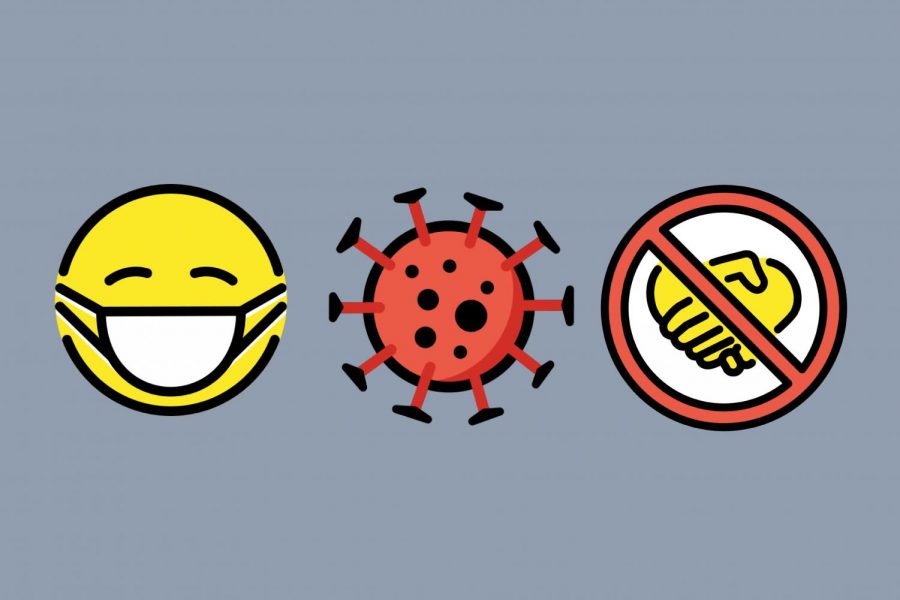How to stay as safe as possible in Evanston during COVID-19
A team of researchers from Northwestern and Stanford University developed a model predicting how COVID-19 spreads in cities. They hope to use it to help cities devise reopening and closing plans to best reduce infection rates and disparities between groups.
August 16, 2020
If you plan to come to Northwestern this fall, you already know that COVID-19 will make campus look a little different. Whether it’s socially distant desks in a classroom or limited choices when it comes to accessing different parts of campus, the in-person experience has been re-engineered to allow for more stringent safety guidelines. While no one has to tell you to wash your hands, avoid touching your face or to stay six feet apart, there are additional steps you can take to ensure your safety.
The first week on campus is usually a barrage of hugs and handshakes as students say goodbye to their families and hello to new lifelong friends. While much of that will be gone now with the virtual Wildcat Welcome, you should still minimize contact with people. Dr. Anthony Fauci, director of the National Institute of Allergy and Infectious Diseases, even argues that handshaking should stop even after the pandemic.
“I don’t think we should ever shake hands ever again, to be honest with you,” Fauci said in a Wall Street Journal podcast. “Not only would it be good to prevent coronavirus disease, it probably would decrease instances of influenza dramatically in this country.”
At least for COVID-19, no-contact greetings are best, but feel free to go the old-fashioned route and tip your hat at someone as they walk by.
Another tip to consider is choosing the more environmentally friendly option to get around campus. As the weather gets cooler, many students usually opt for the Campus Shuttle, which conveniently takes students between North and South Campus in mere minutes. Instead, to avoid potential crowding, take advantage of NU’s bike-friendly side and use its bike lanes to traverse the campus. If that’s not an option for you, taking the scenic walk around the lake or through the fall foliage is a wonderful — if longer — choice.
On campus, the University is taking precautions such as requiring face masks and routinely cleaning common areas, but your home (or dorm room) is your sanctuary, and keeping it clean is just as important. As far as cleaning goes, the U.S. Centers for Disease Control and Prevention recommend alcohol-based wipes or spray containing at least 70 percent alcohol for touch screens. High-touch surfaces in common areas should be cleaned and disinfected daily, and can include door handles, phones and light switches. MIT Medical advises not using the same wipe for multiple surfaces because germs can get transmitted from the wipe to new areas.
Many experts recommend changing into new clothes for when you’re at home, as well as throwing out or cleaning your mask. The CDC encourages individuals not to shake their laundry when bringing it to the washer, so as to minimize the possibility of the virus dispersing in the air.
The American Chemistry Council released a list of disinfectants effective against COVID-19. Some popular options on that list include various Lysol and Clorox products, Germ-X and Scrubbing Bubbles Disinfectant Restroom Cleaner II. You can purchase disinfectants from Target, CVS and D&D Finer Foods, all just a few blocks away from campus, though they might be hard to get due to demand.
NU does not recommend using gloves for protection from the virus — though some chemical disinfectants still require their use — stating gloves “create a false sense of security.” The University states that people who wear gloves are less inclined to wash their hands and are more likely to touch contaminated surfaces; gloves also offer no additional protection, because the virus does not enter through the skin.
Sticking to these tips and following University and CDC guidelines can help enhance your safety while living in Evanston during COVID-19. And according to Dr. Tedros Adhanom Ghebreyesus, the director-general of the World Health Organization, individuals can learn to live with the virus while also taking steps to protect themselves and others.
“Young people can be infected… and young people can transmit the virus to others,” he said in a July virtual press conference. “That’s why young people must take the same precautions to protect themselves and protect others as everyone else. They can be leaders. They should be leaders and drivers of change.”
Email: [email protected]
Twitter: @emmaeedmund


